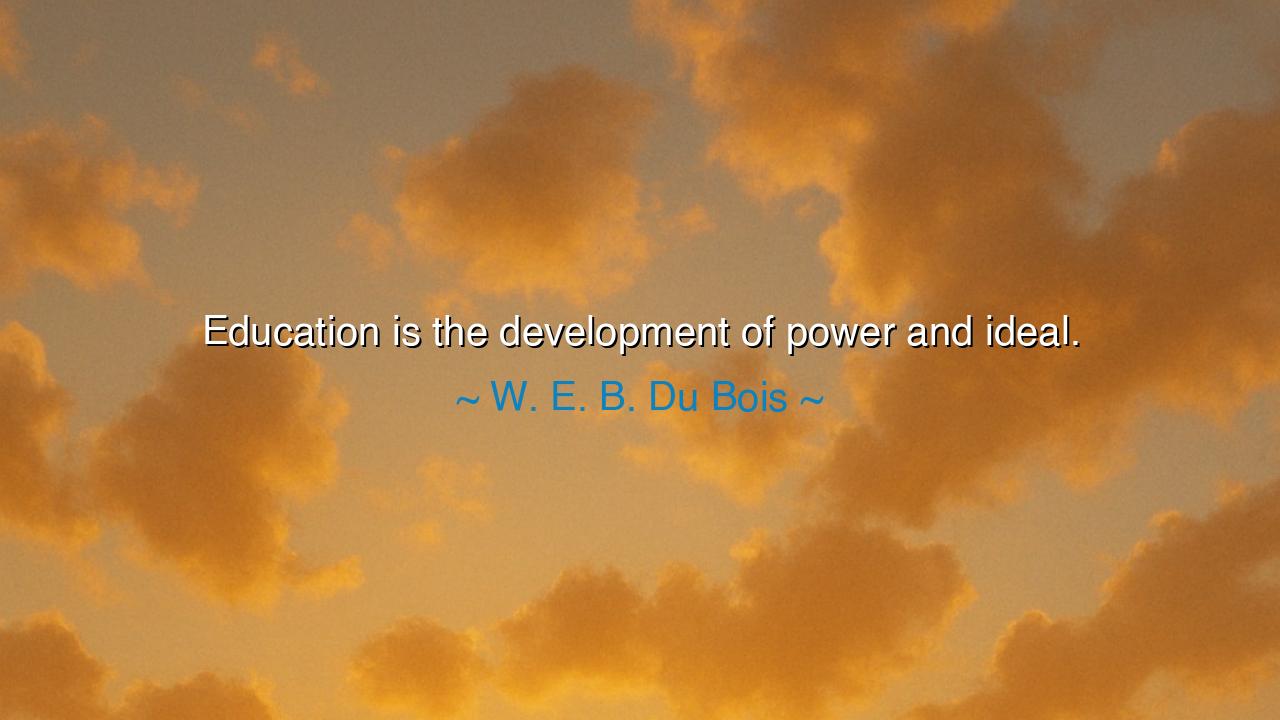
Education is the development of power and ideal.






Hearken, O seeker of wisdom, to the words of W. E. B. Du Bois, who declared: “Education is the development of power and ideal.” In this brief utterance lies the weight of generations, the destiny of nations, and the very shaping of the soul. To speak of education is not merely to describe the learning of letters or the memorizing of numbers. It is to speak of the awakening of the spirit, the sharpening of the mind, and the lifting of the heart toward the heavens of possibility. Power without ideal is tyranny. Ideal without power is impotence. Together they form the balance by which humanity ascends from dust to dignity.
Consider, then, the first pillar: power. By this Du Bois did not mean brute force, nor the mastery of another’s body or wealth, but rather the inner strength that comes from knowledge rightly applied. It is the power to reason when others falter, the power to stand upright when storms rage, the power to act with clarity in the face of confusion. This is the strength education bestows upon the prepared soul. Without it, man is as a leaf tossed upon the wind, but with it, he becomes as an oak rooted deep, unshaken by passing tempests.
And now the second pillar: the ideal. For what is strength without direction? A blade sharp but turned against friend and kin, a fire burning but consuming all in chaos. The ideal is the vision, the dream, the higher order toward which power is bent. It is justice, beauty, truth, and compassion woven into the fabric of daily life. To educate the mind without the ideal is to forge a weapon and leave it in the hands of the reckless. But to guide that weapon with vision is to transform destruction into creation, selfish gain into service for the many.
History itself testifies to this union. Consider the life of Frederick Douglass, born into bondage, denied letters, yet seizing fragments of knowledge with the hunger of the soul. He said that once he learned to read, he could no longer be a slave. Why? Because with education he gained power, and with his vision of freedom he held fast to an ideal. His writings stirred nations, his voice broke chains, and his very life proclaimed that the education of the oppressed is the most dangerous and most sacred act: dangerous to the tyrant, sacred to the cause of humanity.
Du Bois, who stood in the dawn of the twentieth century, gazed upon a people still emerging from the long night of slavery. He beheld that the path forward was not in wealth alone, nor in toil without thought, but in education that wove together strength and vision. He called for the Talented Tenth, men and women who would cultivate their gifts not for vanity but to uplift their people. In his teaching we see again the wisdom of the ancients, who proclaimed that the true ruler must be philosopher, and the true philosopher must serve the city with justice.
Let us not deceive ourselves: the world yet abounds in examples of power divorced from ideal—nations armed to the teeth but devoid of mercy, leaders cunning in strategy yet barren of compassion. Likewise, many dreamers perish with their visions unrealized, for they lack the power to bring forth into reality the beauty they behold in thought. Thus, the harmony of Du Bois’s teaching remains as vital in this age as in his own.
What, then, is the lesson for us who walk the earth today? It is this: seek always to cultivate both the power of knowledge and the ideal of virtue. Read deeply, learn tirelessly, sharpen your mind as a craftsman sharpens his tool. But also dream nobly, act justly, and align your strength with a cause greater than yourself. Without this union, you will either grasp blindly in darkness or gaze idly at visions you cannot bring to birth.
So I charge you, children of tomorrow: let your education be not shallow, but profound. Let it kindle both power and ideal within you. Speak truth though it trembles in your throat. Act rightly though the path is hard. Use your learning not for the swelling of your pride but for the lifting of the world. In this way, you shall honor the wisdom of Du Bois, and more than that, you shall carve your own name upon the enduring scroll of those who chose not only to know, but to live for what is highest.






AAdministratorAdministrator
Welcome, honored guests. Please leave a comment, we will respond soon